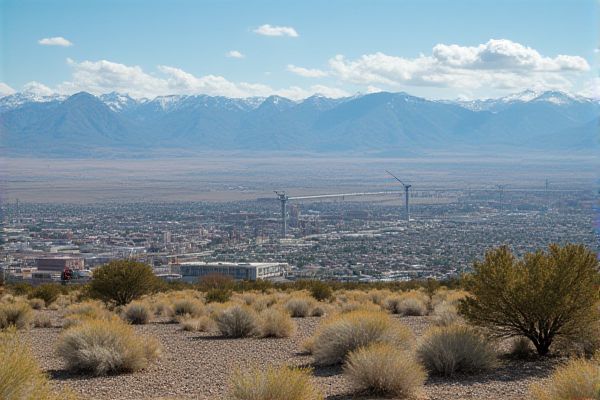
Transportation and commuting in Nevada: Public transportation options available statewide. Las Vegas Monorail for strip travel. Regional Transit Commission (RTC) in major cities. Long-distance bus services connect cities. Interstate highways facilitate easy road travel. Carpool lanes in urban areas for efficiency. Car rentals available at main airports. Biking infrastructure expanding in urban areas. Ride-sharing apps operate extensively statewide. Limited public transport in rural regions.
Public transportation options available statewide.
Nevada offers a variety of public transportation options, including urban and rural services managed by different transit providers such as the Regional Transportation Commission of Southern Nevada, Regional Transportation Commission of Washoe County, and various rural transit services. The Nevada Department of Transportation administers federal transit funding programs and coordinates with state transit providers to ensure comprehensive coverage across the state.
Las Vegas Monorail for strip travel.
The Las Vegas Monorail is a 3.9-mile automated monorail system connecting seven stations along the Las Vegas Strip, providing quick, safe, and environmentally friendly transportation to major hotels, casinos, restaurants, and entertainment venues. With trains arriving every 4-8 minutes and operating from 7 a.m. to as late as 3 a.m. depending on the day, it offers a convenient way to explore the vibrant city. For more information about schedules and routes, visit the Las Vegas Monorail website.
Regional Transit Commission (RTC) in major cities.
The Regional Transportation Commission of Southern Nevada (RTC) is a government agency dedicated to managing public transportation, traffic oversight, and roadway design throughout the Las Vegas Valley. This organization operates a comprehensive bus system, which includes RTC Transit, paratransit, and commuter services, ensuring efficient travel for residents and visitors alike. In addition to transportation services, the RTC plays a critical role in traffic management and planning for future transportation needs. Established in 1965, the RTC serves key cities such as Las Vegas, North Las Vegas, Henderson, and Boulder City. For more detailed information, visit the Regional Transportation Commission of Southern Nevada page.
Long-distance bus services connect cities.
Long-distance bus services in Nevada, including Greyhound and Amtrak Thruway, provide vital connections from cities such as Las Vegas to various regional and national destinations. These services facilitate travel to important locations like the South Strip Transit Terminal and Harry Reid International Airport. Additionally, they extend routes to cities in Arizona, notably Kingman, ensuring comprehensive accessibility. For more detailed information on these transportation options, you can visit the Wikipedia page on Transportation in Las Vegas.
Interstate highways facilitate easy road travel.
Nevada's Interstate highways, maintained by the Nevada Department of Transportation, include I-15, I-80, I-215, I-515, and I-580, facilitating efficient and safe long-distance travel across the state by connecting major cities like Las Vegas, Reno, and Carson City. These highways are integral to the National Highway System, ensuring high levels of service in terms of safety and mobility.
Carpool lanes in urban areas for efficiency.
Carpool lanes in urban areas of Nevada have been criticized for their inefficiency, as they fail to significantly improve traffic flow and are often underutilized. These lanes face enforcement challenges and have a limited impact on reducing congestion and improving air quality. According to a detailed analysis by The Nevada Independent, the shortcomings of carpool lanes suggest a need for reevaluation of their effectiveness and the exploration of alternative traffic management solutions that could offer more tangible benefits to commuters.
Car rentals available at main airports.
At Harry Reid International Airport (LAS) in Las Vegas, car rentals are readily available through multiple companies, including Alamo, Budget, Avis, Enterprise, Hertz, and others, with a convenient Rent-A-Car Center located just a few miles from the airport. The airport offers a wide selection of vehicles, including luxury cars, SUVs, minivans, and passenger vans, with 24-hour shuttle services to the rental counters and car lots.
Biking infrastructure expanding in urban areas.
The Regional Transportation Commission of Southern Nevada is expanding its bike share program in East Las Vegas, adding new electric bikes and docks across several stations, thanks to a significant investment in federal funding secured by Congresswoman Dina Titus. Meanwhile, the Regional Transportation Commission of Washoe County is launching the Biggest Little Bike Network. This ambitious project aims to improve infrastructure in Downtown Reno with protected bike lanes, enhanced intersections, and innovative floating bus stops, all designed to increase safety and accessibility for cyclists, pedestrians, and drivers alike.
Ride-sharing apps operate extensively statewide.
Ride-sharing apps, such as Uber, Lyft, and others, operate extensively in Nevada, offering convenient, affordable, and diverse transportation options, including traditional rides, carpooling, bike-sharing, and even traditional taxi services. These services cater to various needs across the state, particularly in cities like Las Vegas and Reno. For more insights on these services, you can explore the Top Ride-sharing Apps in Nevada, which provide an overview of how these platforms enhance mobility within the region.
Limited public transport in rural regions.
In Rural Nevada, limited public transportation is being addressed through innovative initiatives such as the free transportation service funded by SilverSummit Healthplan. This service provides essential door-through-door rides for Medicaid members and low-income individuals, enabling them to access healthcare, groceries, and social services, thus filling a critical gap in mobility for underserved communities. Additionally, programs like the Nevada Rural Counties RSVP Transportation Program offer escorted door-to-door transportation for frail, homebound, and low-income seniors, as well as persons with disabilities, using volunteer drivers and specialized vehicles.
